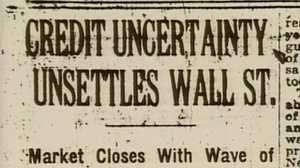Interview: The Highs and Lows of the Crash

Patricia Livermore, daughter-in-law of Jesse Livermore
[The Livermores] lived in utter splendor, typical of the twenties when… society was showy and wealth was displayed. They had a beautiful place on 76th Street in Manhattan on the West Side, off Central Park. They had a floor at 813 Fifth Avenue because Dorothea did not like to go to the West Side to change her clothes. They had a house in Great Neck. They had a summer house in Lake Placid. They had a house in Palm Beach. They had a private railroad car, two yachts. The only yacht that was bigger was J. P. Morgan’s. And they used one of them, the big one, very frequently when they went to Europe. They lived very comfortably…
Jesse Livermore had a ticker tape in every home that he owned, on his railway cars, on his yachts… They had several Rolls Royces, lots of chauffeurs. They had a staff of about 20 or 25 and in each place, in each house, see, and with the exception of Dorothea’s personal maid, they did not take their staffs with them. They simply kept them year-round in all their establishments…
Oh, they lived. They really lived… Mrs. Livermore was a spender. And, of course, she loved to buy. She spent her days buying and buying and buying…
One day Dorothea Livermore decided that her sons should grow up speaking French. So, let’s say, between probably nine or ten o’clock in the morning and four o’clock or four-thirty, whenever Mr. Livermore was due back, she fired her entire staff and replaced them with all French-speaking servants. So that when he came home he wasn’t even able to change his clothes because his new valet didn’t speak English and Mr. Livermore did not speak French. So they finally reached a compromise by the next day that he could keep his valet, but his valet could not talk to the children because the children from that point on were to speak nothing but French. And, of course, she didn’t speak French, so there was very little communication in the family and within a week the old staff was returned and a French governess was retained and that was the end of that little fiasco.

Craig Mitchell, son of Charles E. Mitchell
There’s a telescope on the front porch of the National Golf Links of America in Southampton that people very often nowadays say — what is that telescope for? Well the telescope was for identifying the various members’ yachts. Everybody commuted by yacht over the weekend and we had a little yacht club at the foot of the National. And the head steward, as a new yacht would approach and drop anchor, would come out and read the name of the yacht and then go to the yacht club register and find out which member it belonged to and then he would call and alert the chauffeur at the house to come down and pick up the owner. Of course nowadays, there’s nothing in that yacht basin, totally deserted. In the old days it would be crowded with yachts… That’s just one tiny little example of how things differ today than they were in the old days.
Looking back it seems like a complete dichotomy between the days up until the great crash of ’29 and the subsequent depression and everything that has happened since then… I think one example is the experience of a great friend of my father, Reggie Waterbury, who was almost a member of the family. Reggie was a bon vivant and great fun and he was sort of the number one extra man at every party. And a great, great friend of my sister and mine…
When the Depression came, after the crash and when we got into 1930, Father received a letter from him saying… “Dear Charlie, I will always revere our friendship and remember the great times we’ve had together, but I know that a new world is coming and I’m not prepared to live in it and I’m dropping out. Please don’t have me followed, you will never see me again. I send you all my dearest affection, Reggie.” And indeed, he would go from town to town one step ahead of the detectives my father would send to try and find him. And he was never again located and he was never able to make that transition.
Of course a lot of other people jumped out the window. By noon on Black Thursday there had been eleven suicides of fairly prominent investors. A lot of people either drank themselves to death, committed suicide, or just disappeared. Reggie was one of them. And I will say, looking back on it… the world in those days, prior to the Great Depression was a totally, totally different thing with almost nothing in common to what we live in today.

The Radio Corporation of America (R.C.A.) was the hot tech stock of the Twenties. The young company capitalized on the enormous popularity of radio — as both a manufacturer of radio sets and a leading broadcaster of programming. R.C.A. was one of many stocks that were manipulated by a pool — a group of investors who drove up the price through coordinated purchases. R.C.A. stock plummeted in value when the stock market crashed in October 1929, slumping to $10 a share by 1931. Michael Meehan was the pool operator who steered R.C.A. stock sky-high during the Roaring Twenties.
Michael Nesbitt, grandson of Michael Meehan
R.C.A. was the great glamour stock of the Twenties. It was like what the computer stocks were in a later age… It was very exciting, it was very open-ended. Enormous amounts of money were made in R.C.A. And it was the quintessential pool stock…
A brokerage pool was something that was common in the Twenties, where a number of individuals in Wall Street would pool their money and take a position in the stock. By taking a position, they would quietly accumulate it until they owned two, three, four hundred thousand shares of stock. Then they would begin to, what was called, 'painting the tape.’ The tape that was used then was a narrow piece of paper that went along and printed out all the transactions in the stock. And they would make the stock look exciting. They would trade among themselves and you’d see these big prints in R.C.A. And people will say, it looks as though that stock is being accumulated. They would also plant stories through public relations people about what an exciting stock and company R.C.A. was. All of this, of course, was legal in the Twenties and none of this behavior is legal today.
This stock… typified that market more than anything else. The great prosperity that went along with it… the fact that it was in those days, very cutting-edge technology. It was the newest and most modern thing and it was very exciting…
Would the stock have had the enormous move that it had without the pool? Probably not… The stock was clearly overpriced. But that often happens in a big move in any glamorous stock. It’s very hard to say how open-ended it is, what’s a fair price, where could this stock go, et cetera. So without the pool R.C.A. would still have had quite a significant move, but with the pool it had a much bigger move.








